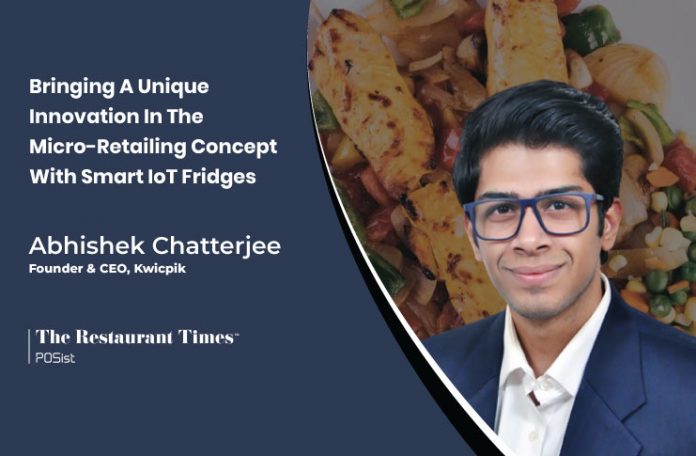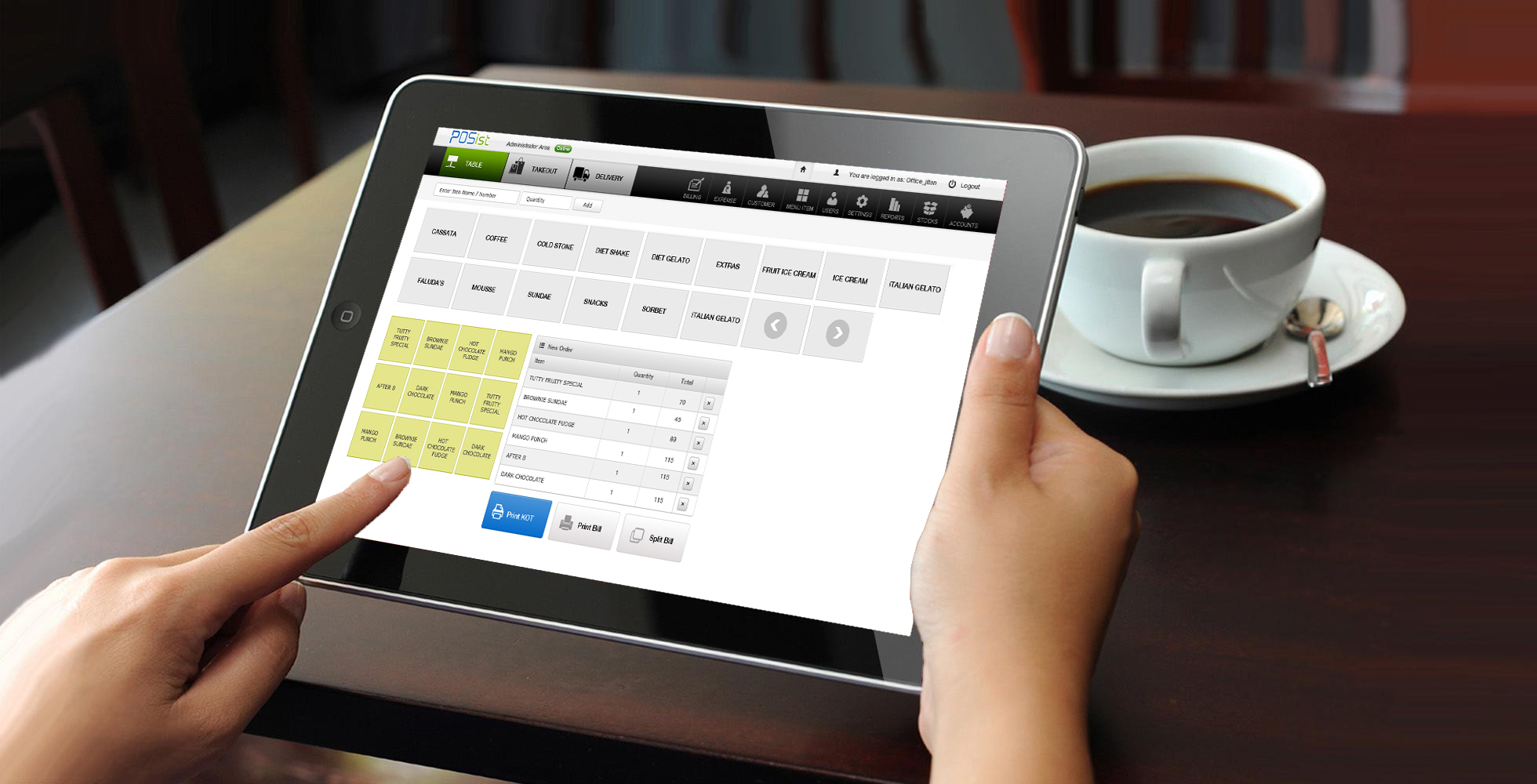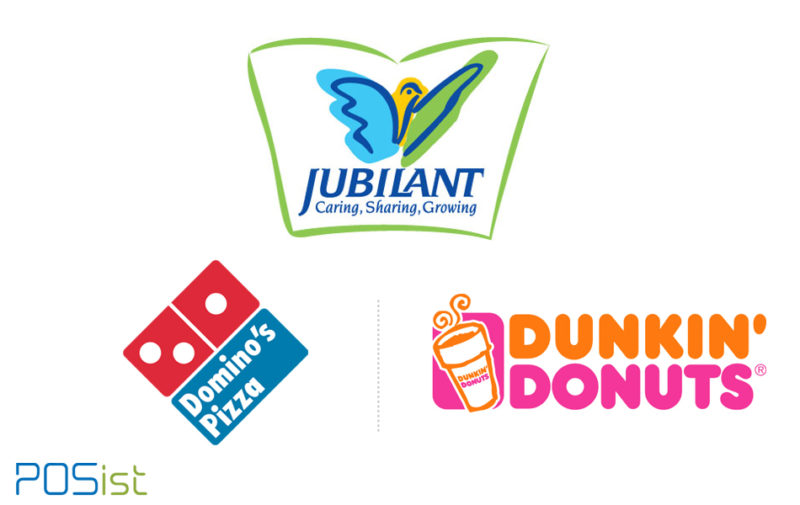Abhishek Chatterjee is the Founder & CEO of Kwicpik, a 1-square-meter micro-retail store that connects users with well-known F&B brands in commercial and residential spaces. Kwickpik uses IoT technology to provide an automated self-checkout provision and uses data analytics to offer F&B products you like even before one thinks of it. A young entrepreneur, Abhishek was raised in Dubai, UAE, and pursued mechanical engineering from the University of Pune. He has an MBA in Entrepreneurship & Finance from IE Business School, Spain. Before starting as an entrepreneur, Abhishek has work experience in Manufacturing, Biz Development, and Market Research.
In Conversation With Abhishek Chatterjee, Founder & CEO, Kwicpik
In an exclusive conversation with The Restaurant Times, Abhishek Chatterjee, Founder & CEO, Kwicpik, discusses how the brand provides healthy, fresh, affordable meals and F&B products to commercial spaces via IoT smart fridges.
A Young Entrepreneur’s Journey in the F&B industry
The idea of Kwicpik came from Abhishek’s experience in his university days. His reluctance to cook and the whole overwhelmed delivery sector inspired him to enter into this segment.
There is no specific educational qualification that one needs to enter in this industry. It is the passion, and love for food, which takes you a long way. One has to wear different hats, curate the menu, structure logistics, think about food safety, and work on multiple aspects.
The FnB industry is quite a resilient one, even though macroeconomic conditions keep changing. Sharing his current experience with Kwicpik in the Middle Eastern market, Abhishek says it is growing but is also a very challenging one. The last-mile delivery sector is overcrowded. And the challenge that any F&B entrepreneur would face is to retain customers. However, since there are so many platforms, it becomes challenging to retain loyalty.
Kwicpik- Grab, Grub, Go!
The F&B operators have to face many challenges and competition, which puts pressure on the top-line and overheads and also drains a lot of the bottom line. Whether it is the workforce costs or real estate costs, it becomes difficult to sustain the business. Kwicpik provides F&B operators with these micro-retail spaces so that they don’t have to worry about workforce costs, and can easily put the IoT refrigerator in prime locations.
Abhishek points out that there has been quite a lot of research to find a product that would actually fit the idea of a smart fridge and this is where the IoT aspect came in. In addition, the one square metre specification of the product reduces the real estate burden significantly.
The product is an IoT refrigerator that unlocks with the Kwicpik app. The refrigerator has an electronic lock on it. One needs to be registered on the Kwicpik app, add credit card details, and scan the QR code on the fridge with the app to unlock the door, and access the contents inside.
For instance, if someone grabs a juice bar, or a salad bowl, and puts it back in, the fridge identifies the entire movement when someone closes the door of the fridge. All of this takes place through sensors, cloud technology, and as Abhishek points out, this is what makes it an IoT.
Upon asking how Kwicpik actually helps brands to add more value to their services, Abhishek says, “A cloud kitchen brand typically has more brands than a physical restaurant, therefore the menu is enormous. A single-store restaurant has a limited number of food options whereas, in a coworking space, customers have a lot to choose from. The Kwicpik team analyzes large data sets to monitor what the customers are appreciating in meals and products.”
The team conveys this information to the operators where the installers are set up and based on the feedback they receive, they reduce the wastage of meals too. Moreover, the brand also tries to retain the customers by getting a sense of their taste buds and ordering preferences.
Abhishek says that the target market for Kwicpik is not just limited to grocery stores, or beverage providers but also covers restaurants and cloud kitchens.
Market Opportunity For IoT Refrigerators
According to a report by ReportLinker, The Internet of Things (IoT) and traceability for the food and beverage (F&B) manufacturing market is expected to reach $8.43 billion by 2025.
Abhishek says that there’s a new pinnacle for the F&B industry to achieve if they incorporate IoT technology in restaurant operations.
He points out three key areas that IoT helps with:
- There’s effective inventory management and one does not have to rely on a just-in-time model. IoT helps in better inventory planning and helps streamline the entire operations.
- Certain food items might get spoiled because of their shelf life. Due to effective shelf-life management, IoT helps in combating food wastage.
- Third, it greatly helps in streamlining the entire restaurant operations.
Abhishek highlights that IoT refrigerators have been adopted, appreciated, and accepted in various continents, including North America, Europe, and Asia. Even though the IoT ecosystem is relatively nascent in the MENA region, he is hopeful about the future of IoT as there is a lot of market potential for the product. Upon discussing the product’s pricing, Abhishek points out that the price points of the IoT refrigerator differs on the basis of location.
Kwicpik conducts small survey feedback and also offers tasting of the products. In addition, before onboarding a brand, they offer them a leaflet of the restaurants or cloud kitchens they currently partner with. This is how the brands are able to pick and choose what kind of cuisines they want. Kwicpik has currently tied up with cloud kitchens and a couple of beverage partners. Moving forward the brand wants to partner with eateries, confectionaries, and small catering services.
The Ecosystem Of The F&B industry In The UAE
Abhishek highlights that the UAE is a highly lucrative market. The region has a lot of capital surplus for investment, and the entrepreneurial space is growing.
“There is funding available, but it is just about proving and matching the concept with the customer needs, and this is quite an important factor to realize,” Abhishek adds.
According to him, in the middle eastern region, there are three main hubs that F&B operators have to keep in mind, i.e. UAE, Saudi Arabia, and Egypt. If one taps these three markets, that’s good enough to have a Series A and Series B funding round.
Abhishek concludes the insightful session by disclosing the future plans of the brand,
“We want to make Kwicpik synonymous with automated takeaways. Be it a restaurant, grocery, confectionery, that is probably just a few floors down, or just a few steps away, the customer can have quick access to basic necessities. To sell that convenience to customers is the ultimate aim. We want to expand the brand in various locations across the Gulf and perhaps in North Africa. But the idea is to start small, and then scale back, therefore we are taking small strides now”
Watch Abhishek Chatterjee in an exclusive F&B Talks Session With The Restaurant Times.

















